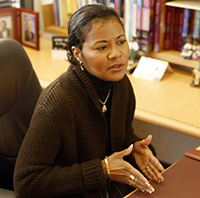Peabody College has launched an initiative designed to help early-career faculty thrive in all aspects of campus life and to guide them toward promotion and tenure. The R.A.C.E. (Research, Advocacy, Collaboration, Empowering) Mentoring project targets new and junior faculty members, and it is particularly useful for faculty of color. Peabody welcomed 14 new faculty this fall, 80 percent of whom are women and minorities.
There is considerable research indicating that faculty of color face unique challenges. For example, a 2015 paper by Peabody Professor Ebony O. McGee indicated multiple instances in which black faculty members were expected to be entertaining when presenting academic research to mostly white peers.

“No matter what they may believe personally, unconscious bias favoring whites influences many people’s idea and ideal of who a researcher or professor should be,” says Donna Ford, professor of special education at Peabody, who heads the R.A.C.E. initiative. “So, faculty of color face particular challenges from the beginning. We want them to know that we’re aware of those challenges, that we not only want to recruit them, but we want to maintain them. That’s where R.A.C.E. comes in.”
All new and junior faculty are invited to take part in monthly R.A.C.E. meetings. In September, Camilla Benbow, Patricia and Rodes Hart Dean of Education and Human Development at Peabody, met with the group to discuss teaching, research, and service expectations of faculty. Sessions are also planned for faculty of color that are specific to their issues and needs. Faculty of color may join Ford’s online R.A.C.E. Mentoring group, which served as the model for the Peabody initiative and also offers a forum for discussing career challenges.
“We want our young faculty to succeed and feel they’re getting the resources and the support and the mentoring here that they might not be able to get anyplace else,” Ford says. “That’s one way to build diversity.”